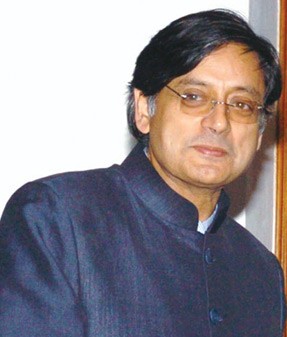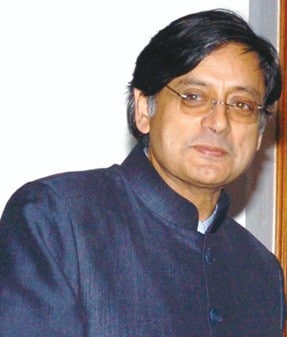|
A little over a year ago, when best-selling author and senior United
Nations diplomat Shashi Tharoor ran for a parliamentary seat in Kerala, he was
heralded as the shining model of the New India. NRIs worldwide and educated
Indian professionals rallied to his side, enamored by his willingness to
sacrifice a flourishing professional career to pry open the stranglehold that
illiterate, corrupt and distasteful anghuta chaaps — “cattle class,” as Tharoor himself famously tweeted — had over
India’s political system.
It came as a rude shock to everyone, therefore, when the urbane,
erudite and articulate minister of state for external affairs was forced to
resign because of his involvement in a seamy scandal involving the granting to
a woman — described variously as a close friend/girlfriend/fiancé — of almost
$15 million in secret “sweat equity” in a cricket franchise for which Tharoor
aggressively lobbied. The tightly-held details of the sweetheart equity were
exposed by Indian Premier League Commissioner Lalit Modi, possibly because he
was promoting a competing franchise.
  |
The virulent public spat that broke out between Tharoor and Modi, who,
until their own interests diverged, were hands in glove together, has brought
the lethal brew of money, corruption, sex, Bollywood and politics that is the
IPL, to a boiling point. The Indian Income Tax Department and other
investigative agencies are hot on the trail of money laundering, proxy
ownership, illicit betting, tax evasion and other insidious IPL business
practices.
But the scandal bubbling around the IPL, welcome as its exposure is,
should not distract from Tharoor’s own culpability, even as he seeks to portray
himself as a sacrificial victim of India’s byzantine politics, as, for example,
in his recent tweet: “Looking forward to thorough inquiry into the IPL. If my
resignation leads to real reform, it will be worthwhile. Our cricket should be
clean.”
Tharoor professed repeatedly that he was “merely mentoring” a business
group in a laudable attempt to lure a cricket franchise to his home state of
Kerala. There is, in fact, incontrovertible evidence that he was far more
deeply involved in the shady bidding process than he has let on. But far more
significantly, for all his protestations over the “besmirching” of his
reputation, Tharoor has provided precious few details or credible defense to
refute the core allegations surrounding the sweetheart deal granted to his
sweetheart, Sunanda Pushkar.
He deflected the widespread perception that Pushkar was fronting for
him with platitudes about the sexism involved in implying “that a reputed
business professional and entrepreneur with a long track record of business
success can, because of her gender, only be seen as a front for someone else.”
It simply defies credulity that Pushkar, an undistinguished sales manager at a
real estate company in Dubai with no previous sports marketing experience,
would have received $15 million in equity in a high flying $330 million cricket
franchise for yet unspecified future “marketing” services. Tharoor’s evasive
defense is an affront to the millions of professional Indian women who work
hard and play by the rules every day.
But even if we were to accept Tharoor’s unconvincing explanation that
Pushkar’s equity was unrelated to him, it was, nevertheless, unseemly and
unethical for him to use his political position and connections to promote a
business venture in which his girlfriend had a substantial stake without
publicly disclosing the blatantly obvious conflict of interest. It reeks of the
very “hypocrisy and double dealing,” he thundered in his statement in
parliament following his resignation, he had entered politics to eliminate.
Instead, Tharoor’s enduring legacy may well be scaling up the
corruption standards of the “cattle class” from their preferred satchels packed
with a measly few lakh rupees to the Goldman Sachs stratosphere, in which tens
of million of dollars are masked through opaque front companies, proxies and
convoluted financial instruments that are hard to trace and even harder to
capture on hidden cameras, which have upended the careers of many anghuta chaap Indian politicians in recent years.
|

